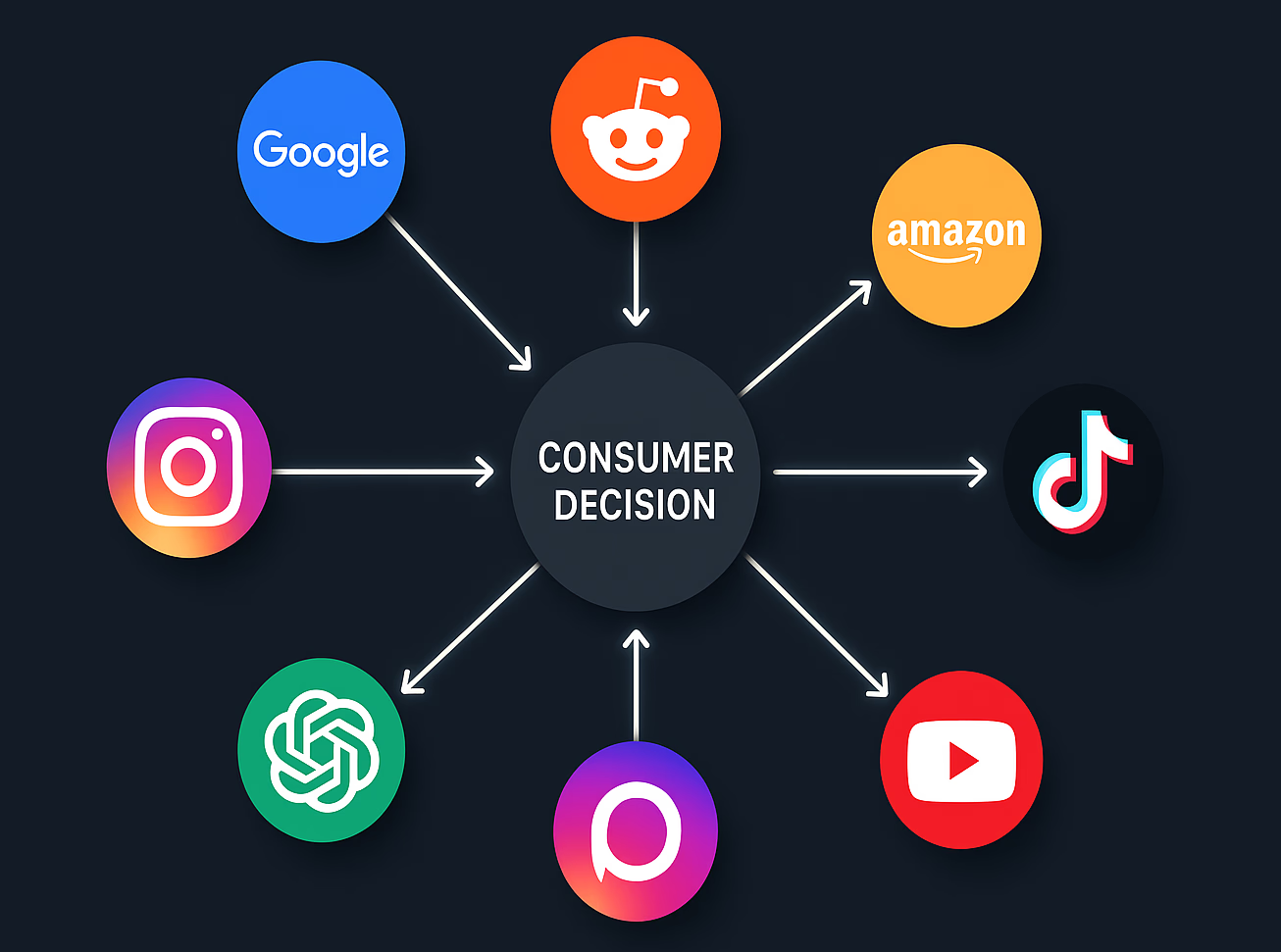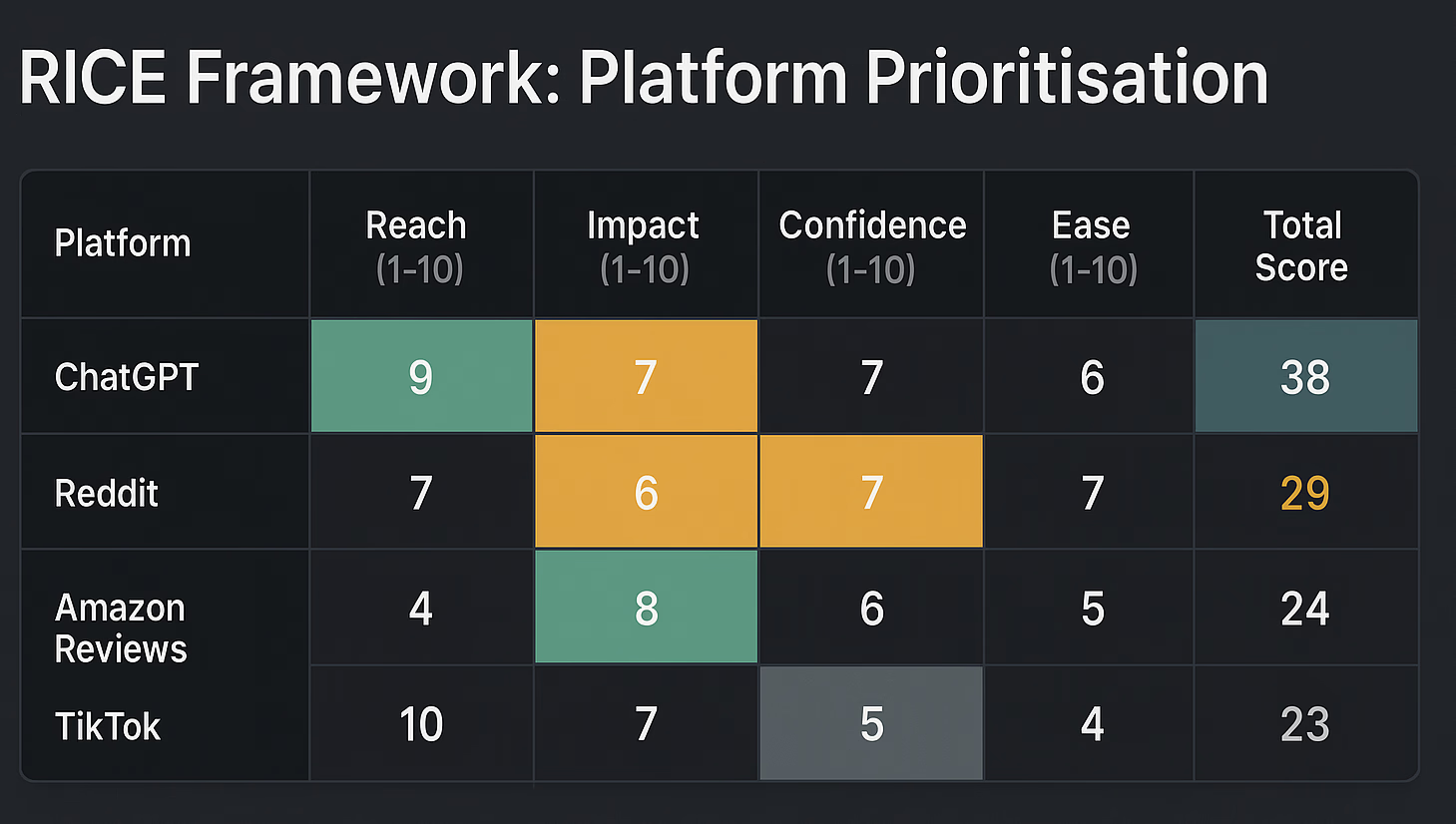Search Everywhere Optimisation: Why Traditional SEO No Longer Works in 2026
Traditional SEO feels like shouting into a room where nobody's listening anymore. You rank on page one of Google, your traffic looks respectable, yet conversions remain flat. The disconnect isn't a mystery. Your customers simply aren't deciding on Google anymore. They're validating purchases in Reddit threads, asking ChatGPT for recommendations, scrolling TikTok for reviews, and checking Amazon ratings before they ever visit your website. While you've been perfecting title tags and building backlinks, the entire playing field shifted beneath you.
Search everywhere optimisation means creating strategic presence across all platforms where your customers make decisions, not just Google. Focus on earning trust signals (mentions, citations, reviews) on 2-3 key platforms where your audience validates choices: Reddit for authenticity, ChatGPT for recommendations, TikTok for discovery, or Amazon for social proof. Prioritise validation over visibility.
The Google Trap: Why Winning Search Rankings Means Nothing
Most businesses remain trapped in an outdated model. They chase rankings, tweak meta descriptions, obsess over Core Web Vitals, and celebrate when they hit page one. Yet consumer behaviour has fundamentally shifted in ways traditional SEO metrics don't capture. Nearly 40% of young people now turn to TikTok or Instagram when looking for places to eat, bypassing Google Search and Maps entirely. Over half of all product searches begin on Amazon, not search engines. Meanwhile, young adults aged 18-24 use Instagram (67%) or TikTok (62%) more frequently than Google (61%) when searching for local businesses.
This creates a strange paradox. Your Google rankings might be excellent, but customers are making buying decisions elsewhere. They see your product on TikTok, check reviews on Amazon, validate it in a Reddit thread, ask ChatGPT for alternatives, and complete the purchase. All without visiting your site.
The issue isn't that Google became less important. Rather, consumer behaviour fundamentally changed. People don't search anymore in the traditional sense. No more typing keywords, scanning ten blue links, weighing options carefully. Instead, they make rapid decisions across multiple touchpoints simultaneously, often in unexpected places.
How Consumer Decision-Making Actually Works
From a neuromarketing perspective, the modern consumer journey isn't a funnel. It's a constellation of micro-decisions happening at once. Each platform serves a distinct psychological function:
→ What to click: Google
→ What to trust: Reddit threads and reviews
→ What to buy: Amazon, TikTok Shop
→ What to try: App Store ratings
→ What to think: YouTube videos and podcasts
→ What to believe: ChatGPT and Claude
→ Who to follow: Instagram and LinkedIn
These aren't sequential steps. They often occur within minutes of each other. Someone might see your product on TikTok, verify it on Reddit, ask ChatGPT for comparisons, check Amazon reviews, and purchase. Entirely bypassing your website.
Each platform represents a different context. Each mention becomes a trust signal. Each format acts as a lever of influence. Understanding the future of search engine marketing means recognising this fragmented reality. The omnichannel content strategy required today differs entirely from anything that worked five years ago.

What Search Everywhere Optimisation Actually Means
Search everywhere optimisation isn't about posting content everywhere daily. Volume doesn't equal strategic presence. Instead, it means designing your brand to appear wherever your customers actually make decisions.
When someone asks ChatGPT for a recommendation, your brand should feature in that response. When someone checks Reddit for honest opinions, your company needs mentions. When someone browses Amazon, your reviews must be visible and credible. These platforms don't just influence decisions. They are the decision.
This approach acknowledges what integrated communications scholars have understood for decades: messages need consistency across channels, but tactics must adapt to each medium's unique properties. What is integrated communications if not ensuring your brand occupies decision-making moments wherever they occur?
The impact of ChatGPT on SEO illustrates this shift perfectly. AI doesn't scroll through search results like humans. It summarises based on who gets mentioned most frequently and trusted fastest. If your brand isn't part of that validation network, you don't exist in AI's decision-making process. The same principle applies across all platforms.
Platform-Specific Decision Codes
The biggest mistake businesses make is using identical strategies everywhere. They copy a blog post to LinkedIn, share a snippet on Instagram, or convert it to a YouTube video. This fails because each platform operates on unique psychology and algorithms.
TikTok decisions are emotion-driven. People want to feel, not think. Content needs immediacy and emotional resonance. YouTube focuses on retention and perceived expertise. Users seek depth, authority, and proof. Generative SEO services and ChatGPT value clear, factual information from authoritative sources, with no interest in flashy visuals or emotional hooks.
Amazon relies entirely on social proof. Users scroll straight to reviews to understand real experience. Instagram sells aspirational identity. People buy into visions of who they want to become. Reddit demands raw authenticity. Marketing language gets rejected instantly.
Multi platform advertising requires tailored approaches. [Internal link: "multi platform advertising" → Platform-Specific Marketing Strategies for SaaS] What converts on Amazon flops on Reddit. What works on TikTok fails on LinkedIn. Even YouTube SEO AI considerations differ from traditional search optimisation because discovery mechanisms and user intent vary dramatically.

Visibility Versus Validation
Another critical distinction: visibility is merely the entry fee. Validation drives decisions.
Visibility means appearing in search results. Validation means being mentioned and trusted in the conversation. Having a TikTok account is visibility. Being referenced by other TikTok users is validation. Ranking on Google is visibility. Being cited by ChatGPT when someone asks for recommendations is validation. This matters profoundly in an AI-mediated world. Algorithms summarise based on trust signals. Being mentioned on Reddit, cited in articles, reviewed on Amazon, or referenced in podcasts. Without those validation markers, your brand doesn't exist in recommendation engines.
Reputation management examples from successful brands reveal a pattern: they focus less on controlling narratives and more on earning organic mentions. When authentic voices discuss your product across platforms without prompting, that's validation. When journalists cite your expertise, that's validation. When ChatGPT includes you in comparison lists, that's validation.
Search everywhere optimisation prioritises earning trust signals across platforms, not merely creating content. Being trustworthy isn't just ethical. It's the only way to remain visible.
How to Prioritise Platforms
You don't need presence on every platform. You need trust somewhere that matters. Most businesses should focus on two or three platforms maximum.
Use a simple prioritisation framework:
→ Reach: How many people search there daily?
→ Impact: How much business impact could it generate?
→ Confidence: How confident are you about succeeding there?
→ Ease: How straightforward is execution?
Score each from 1 to 10, multiply by reach, and you'll identify where to start. For most businesses, dominating two platforms is sufficient.
Perhaps you focus on getting cited by ChatGPT and mentioned in Reddit threads. Or you concentrate on Amazon reviews and YouTube search dominance. Or you become the referenced expert in podcasts and industry publications.
Strategic presence beats omnipresence. When you execute well on chosen platforms, influence compounds automatically. Reddit mentions get indexed by Google. ChatGPT citations reinforce web authority. Dominating Amazon reviews influences decisions that started on TikTok.
You're not aiming to be everywhere. You're weaving yourself into the fabric of decision-making in your industry.

Conclusion
Search everywhere optimisation represents the natural evolution of how people discover, evaluate, and choose. Traditional SEO isn't dead. It's simply one component within a much larger ecosystem. Your competitors remain focused on Google's rules while the game has moved elsewhere.
Right now, you have an opportunity to establish presence where decisions actually happen, before everyone else catches up. Start with one platform outside Google where your customers validate decisions. Focus on earning trust there before expanding anywhere else. The question isn't whether to adapt. The question is: where will you show up first?
Want to build a search everywhere optimisation strategy for your business? Book a free 30-minute consultation to identify which platforms matter most for your industry.


